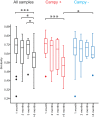Susceptibility to Campylobacter infection is associated with the species composition of the human fecal microbiota
- PMID: 25227462
- PMCID: PMC4172070
- DOI: 10.1128/mBio.01212-14
Susceptibility to Campylobacter infection is associated with the species composition of the human fecal microbiota
Abstract
The gut microbiota is essential for human health, but very little is known about how the composition of this ecosystem can influence and respond to bacterial infections. Here we address this by prospectively studying the gut microbiota composition before, during, and after natural Campylobacter infection in exposed poultry abattoir workers. The gut microbiota composition was analyzed with 16S amplicon sequencing of fecal samples from poultry abattoir workers during the peak season of Campylobacter infection in Sweden. The gut microbiota compositions were compared between individuals who became culture positive for Campylobacter and those who remained negative. Individuals who became Campylobacter positive had a significantly higher abundance of Bacteroides (P = 0.007) and Escherichia (P = 0.002) species than those who remained culture negative. Furthermore, this group had a significantly higher abundance of Phascolarctobacterium (P = 0.017) and Streptococcus (P = 0.034) sequences than the Campylobacter-negative group, which had an overrepresentation of Clostridiales (P = 0.017), unclassified Lachnospiraceae (P = 0.008), and Anaerovorax (P = 0.015) sequences. Intraindividual comparisons of the fecal microbiota compositions yielded small differences over time in Campylobacter-negative participants, but significant long-term changes were found in the Campylobacter-positive group (P < 0.005). The results suggest that the abundance of specific genera in the microbiota reduces resistance to Campylobacter colonization in humans and that Campylobacter infection can have long-term effects on the composition of the human fecal microbiota.
Importance: Studies using mouse models have made important contributions to our understanding of the role of the gut microbiota in resistance to bacterial enteropathogen colonization. The relative abundances of Escherichia coli and Bacteroides species have been pointed out as important determinants of susceptibility to Gram-negative pathogens in general and Campylobacter infection in particular. In this study, we assessed the role of the human gut microbiota in resistance to Campylobacter colonization by studying abattoir workers that are heavily exposed to these bacteria. Individuals with a certain composition of the gut microbiota became culture positive for Campylobacter. As their microbiotas were characterized by high abundances of Bacteroides spp. and E. coli, well in line with the findings with mouse models, these bacterial species likely play an important role in colonization resistance also in humans.
Copyright © 2014 Dicksved et al.
Figures



References
-
- Jakobsson HE, Abrahamsson TR, Jenmalm MC, Harris K, Quince C, Jernberg C, Bjorksten B, Engstrand L, Andersson AF. 2013. Decreased gut microbiota diversity, delayed Bacteroidetes colonisation and reduced Th1 responses in infants delivered by caesarean section. Gut 63:559–566. 10.1136/gutjnl-2012-303249 - DOI - PubMed
-
- Saulnier DM, Riehle K, Mistretta TA, Diaz MA, Mandal D, Raza S, Weidler EM, Qin X, Coarfa C, Milosavljevic A, Petrosino JF, Highlander S, Gibbs R, Lynch SV, Shulman RJ, Versalovic J. 2011. Gastrointestinal microbiome signatures of pediatric patients with irritable bowel syndrome. Gastroenterology 141:1782–1791. 10.1053/j.gastro.2011.06.072 - DOI - PMC - PubMed
-
- Vrieze A, Van Nood E, Holleman F, Salojärvi J, Kootte RS, Bartelsman JF, Dallinga-Thie GM, Ackermans MT, Serlie MJ, Oozeer R, Derrien M, Druesne A, Van Hylckama Vlieg JE, Bloks VW, Groen AK, Heilig HG, Zoetendal EG, Stroes ES, de Vos WM, Hoekstra JB, Nieuwdorp M. 2012. Transfer of intestinal microbiota from lean donors increases insulin sensitivity in individuals with metabolic syndrome. Gastroenterology 143:913–916.e7. 10.1053/j.gastro.2012.06.031 - DOI - PubMed
Publication types
MeSH terms
Substances
LinkOut - more resources
Full Text Sources
Other Literature Sources
Medical
Research Materials
Miscellaneous
